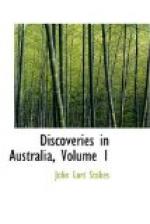During the time that Miago was on board we took great pains to wean him from his natural propensity for the savage life by instilling such information as his untutored mind was capable of receiving, and from his often-expressed resolutions we were led to hope a cure had been effected; great was our disappointment then on finding that in less than a fortnight after our arrival, he had resumed his original wildness, and was again to be numbered amongst the native inhabitants of the bush. To us he had been the source of great mirth, by the absurd anecdotes he sometimes related about his countrymen. His account of their conjectures respecting the arrival of the first settlers may amuse the reader; he said, “the ships were supposed to be trees, and the cattle large dogs (the only animal besides the kangaroo known to them) whose size and horns excited such alarm, that one which strayed into the bush being met by a party of natives made them climb up the nearest trees in the greatest terror.”
STATE OF THE COLONY.
It may give some definite idea of the neglected state of this infant colony, to mention that during the entire period of our absence—a space of six months—there had been but one arrival there, and that not from England. The solitary visitor was H.M.S. Pelorus from the Indian station. The want of communication with the mother country was beginning to be felt severely, and in matters of graver moment than mere news. Many necessary articles of home manufacture or importation, scarcely valued till wanted, were now becoming almost unattainable: one familiar instance will illustrate at once how this state of things presses upon the comfort of the colonists; the price of yellow soap had risen to four shillings per pound!




